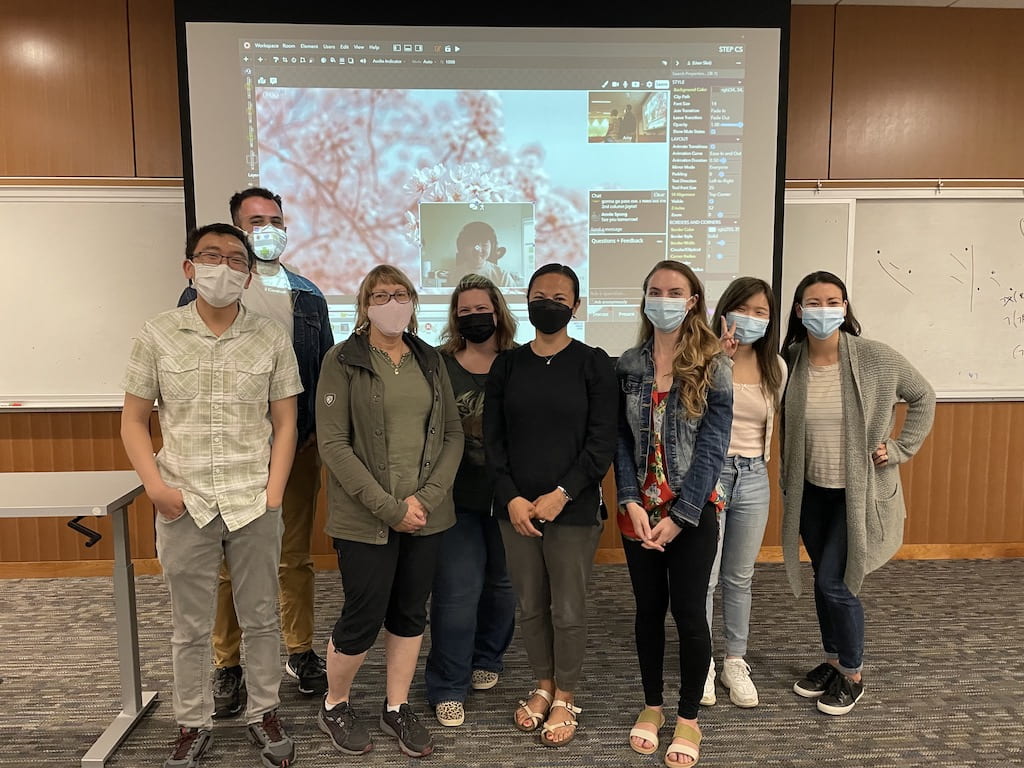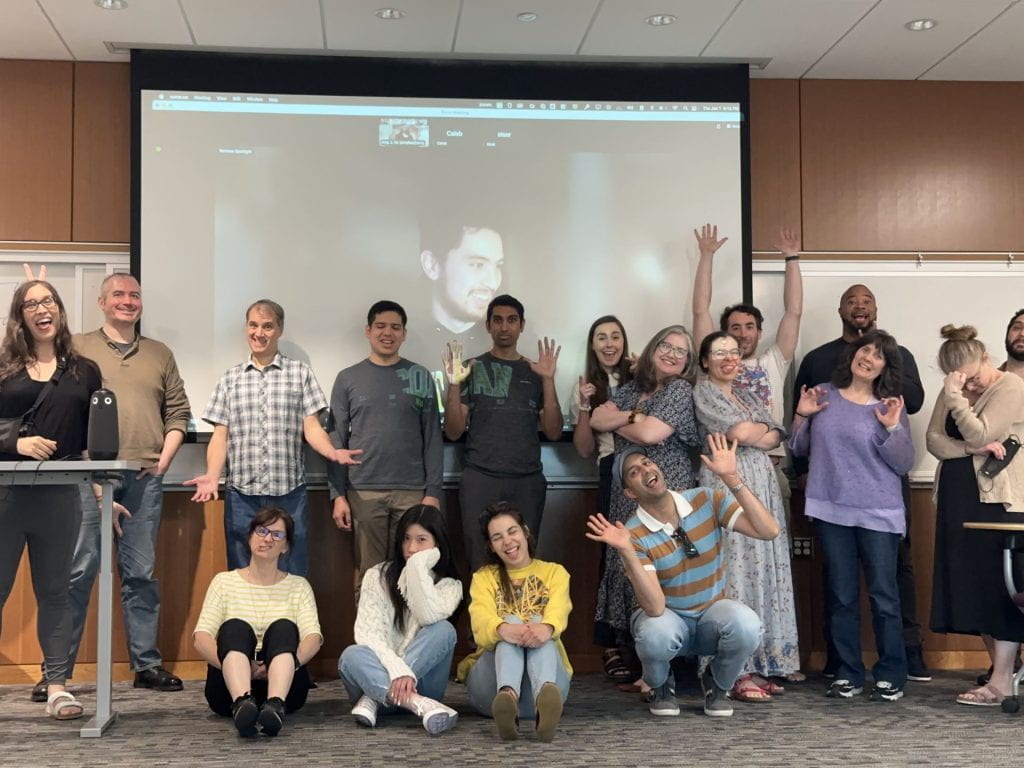



Interested in becoming a middle or high school CS teacher in Washington state?
Our College of Education offers a state-approved pathway for aspiring teachers to do exactly that. And it couldn’t be more needed: fewer than half of middle and high schools in Washington state teach any CS, and when they do, only a fraction of students engage. Less than 1% of students in Washington state learn anything about CS. Additionally, 90% of CS teachers in Washington state are white men or women, even though only 75% of Washington youth are white. Schools desperately need teachers in the classroom that represent the full racial, ethnic, ability, and class diversity of our state.
The program is part of the University of Washington’s top-ranked 1-year Masters in Teaching (called STEP, short for Secondary Teacher Education Program), which starts in Spring each year. STEP CS is a full-time 5th quarter add-on endorsement, which means that teacher candidates enroll in the 1-year degree, earn a first endorsement in math, science, social studies, language arts, or world languages, then stay for an additional quarter to earn a second endorsement in CS.
This is not a program designed to grind you down (as many CS learning experiences in higher education can unfortunately be). We’ve instead designed it to be playful, joyful, and restorative, both to help teacher candidates recover from the long year of learning and teaching, but also to demonstrate how CS learning and teaching can also be all of those things. Candidates leave with a new appreciation for the many things that computing can be in students’ lives and society more broadly and a community of peers and mentors to support their lifelong learning about CS teaching. And, thanks to generous support from the University of Washington, the National Science Foundation, and philanthropic funders, tuition and stipend support is available.
This dual-endorsement structure not only makes you a competitive candidate for teaching positions, but positions you well to teach both standalone CS courses, as well as integrate CS into other subject areas that you teach. If you’re interested in teaching CS, that means choosing another subject area to teach as well. And if you’re interested in teaching other subject areas, CS is a great addition to expand your teaching range job prospects.
Have a question you don’t see answered below? Write Professor Amy J. Ko and she’ll answer it!
Is this a CTE endorsement?
No, this is Washington state’s K-12 CS endorsement, which is valid for any CS teaching position, but it is not a CTE endorsement. This program focuses fully on CS teaching. Graduates will likely be eligible for conditional CTE certification for districts that prefer or require a CTE-specific endorsement, but this should be verified with the school district.
Do I have to have a CS background to enroll?
No. The only CS content knowledge we expect teachers to have is some exposure to programming. An introductory programming course would suffice, as would any practical experience with programming equivalent to a 1-quarter or 1-semester programming course. We will refresh CS content knowledge needed to teach a range of middle and high school courses, but having more extensive CS experience will broaden your range. Students in the program have used a variety of languages to practice teaching; there is no particular programming language we expect you to know.
For those with more substantial CS backgrounds (several courses, a bachelor’s degree, or perhaps experience as a professional software developer), this program is an opportunity to learn foundational concepts in CS teaching in general. Knowing CS isn’t the same as knowing how to teach CS; this program will teach you the foundational skills for being an outstanding, equity and justice-focused CS teacher.
Do I have to be a STEP student to participate?
Two groups can participate:
- Fully-enrolled STEP graduate students staying for a 5th quarter. We will share information throughout your time in STEP and post enrollment information in Winter quarter of each year.
- In-service teachers with prior teaching experience who want deeper preparation in critical CS pedagogy and to pursue the state’s CS endorsement. Teachers can enroll in the three pedagogy courses, but skip the field experience, for a total of 9 credits. Teachers enroll as non-matriculated students, which are charged per credit, though we often have funding to cover some or all of tuition from state grants. We will post an application form in February of each year; registration occurs in March and classes begin at the end of March/beginning of April through mid-June.
I’m an undergraduate. How can I prepare to apply?
The most important thing to do is prepare to apply to the STEP program. This involves a few key steps:
- Decide what first endorsement to pursue. STEP offers mathematics, sciences, social studies, language arts, and world languages endorsements. Each has specific course requirements that you must meet prior to applying to STEP. For example, the mathematics endorsement requires calculus, linear algebra, statistics, and geometry. Whatever you choose, complete the required courses before you apply.
- Follow the steps to apply on the College of Education website.
The deadlines for the program are the beginning of October each year, for Spring start the following calendar year. That means you’ll want to prepare materials and ask any questions that you have the summer before you want to apply. Here are a few few possible timelines:
- Apply in Autumn, graduate in Winter, start in Spring. This doesn’t leave much time for a break, but doesn’t require planning any gap time.
- Graduate in Spring, apply in Autumn, start the next Spring. This offers a 9 month gap, which is time for a break and time to work. You can even apply to substitute teach without certification, giving you a bit of experience in secondary classrooms before you begin.
What courses does the endorsement include?
The course are taught by faculty in across the College of Education (Anne Beitlers), The Information School (Amy Ko), and the Paul G. Allen School of Computer Science & Engineering (Brett Wortzman), all with extensive experience teaching CS in middle and/or high school. We also have several outstanding doctoral students who teach in the program (e.g., Jayne Everson).
The additional 5th quarter includes four CS-specific courses:
- EDTEP 577 Justice and Equity in Computer Science Teaching (online, Mondays 430-620). This course covers foundational intersections between computer science content knowledge and issues of diversity, equity, inclusion, and justice. Addresses these issues in the computer science classroom, as well as society more broadly, developing critical consciousness of computer science and society. This course is taught by Professor Amy Ko, who is an experienced higher education and high school CS teacher, but also a leading researcher in CS education.
- EDTEP 590 Teaching Computer Science in Secondary Schools (online, Tuesdays 430-620). This course develops skills in developing, rehearsing, enacting, and reflecting upon developmentally appropriate computer science lesson and unit plans. Students write learning objectives that consider prior knowledge and specific needs of a diversity of learners, developing skills to deconstruct and analyze lessons and plan the scope and sequence of longer units of study. Draws upon culturally relevant computing, project-based learning, and critical consciousness. This course is taught by Associate Teaching Professor Brett Wortzman, who is an experienced high school and higher education CS teacher, as well as an extensive CS professional development provider.
- EDTEP 574 Assessment in Secondary Education – Computer Science (online, Wednesdays 430-620). This course Surveys approaches to formative and summative assessment of computer science knowledge from both equity and psychometrics perspectives, and impacts of assessments on identity, interest, self-efficacy, and mindset. Emphasizes deliberate practice on computer science assessment design and critique and the tradeoffs of assessment automation technologies in supporting learning. This course is taught by Ph.D. student Jayne Everson, who is an experienced high school math, physics, and robotics teacher, and who is studying critical CS pedagogy in her research.
- EDTEP 602 Field Experience Computer Science – Secondary (in-person, Thursdays 430-620). This course offers practice teaching computer science in a supervised middle or high school placement in partner schools and districts who are working to diversify the teaching field. Candidates can choose from a menu of options:
- Student teaching. You’ll be placed with a CS teacher and school in Puget Sound, likely in in one of our partner districts in Seattle Public Schools, Highline Schools, or Shoreline Schools. You’ll critique your practices and receive feedback on ways to align their practices with equity and justice teaching pedagogy.
- Long-term substitute teaching in a CS classroom for 2 or more weeks, or some other related opportunity to apply learning, such as running an after school camp.
- In-service teaching. If you’re already teaching CS, great! We’ll make space for you to reflect on your practiice with your cohort.
Regardless of how you practice, we’ll do weekly sharing about a problem of practice in small groups, focusing on CS pedagogy.
How do I get certified to teach?
Before you graduate, you’ll take the NES Computer Science exam, which primarily tests CS content knowledge. Passing this exam certifies you to teach CS in Washington state. You’ll have extensive support in preparing for this exam, including learning CS concepts in EDTEP 577, an extensive practice guide, and study groups led by the teaching team. If you’re already confident in your CS content knowledge, you can take the exam at any time before you start teaching. Alternatively, you can take it near the end of your 5th quarter, studying with your peers with the support of the faculty.
Is tuition really free?
In 2022, we received generous gifts from the University of Washington, the National Science Foundation, Schmidt Futures, and Google to subsidize cost of attendance. These gifts are flexible, but our current priority is subsidize teacher candidate’s tuition and fees (~$6,000 USD) and NES exam fees (~$150 USD). Additionally, for teacher candidates who would diversify the CS teaching workforce in Washington state, we are offering up to $2,000 USD in stipends to cover cost of living. In the context of CS teaching, our state’s teaching workforce is predominantly cis non-disabled, neurotypical white men and women. Therefore, diversifying our teaching community means welcoming teachers who identify as Black, African, Latina/o/e/x, Pacific Islander, Native American, Alaska Native, Native Hawaiian, and/or Pacific Islander; teachers who are trans, non-binary, gender non-conforming; and teachers who are disabled and/or neurodivergent. But diversity isn’t limited to these categories above; we seek to recognize all forms of diversity.
There are also other sources of funding. For example, the Washington Student Achievement Council offers Teacher Shortage Awards for areas of need, and CS is one of those areas. These awards usually come with conditions; see their website for details, or talk to the STEP CS advising staff for guidance.
In-service teachers are eigible for tuition support if they do not have other sources of funding. Support will be prioritized according to the same diversity goals above.
Look for an application link here each Autumn.
Can you send me notifications about updates, deadlines, and funding opportunities?
Yes! Fill out this interest form and we’ll send you all of these things.